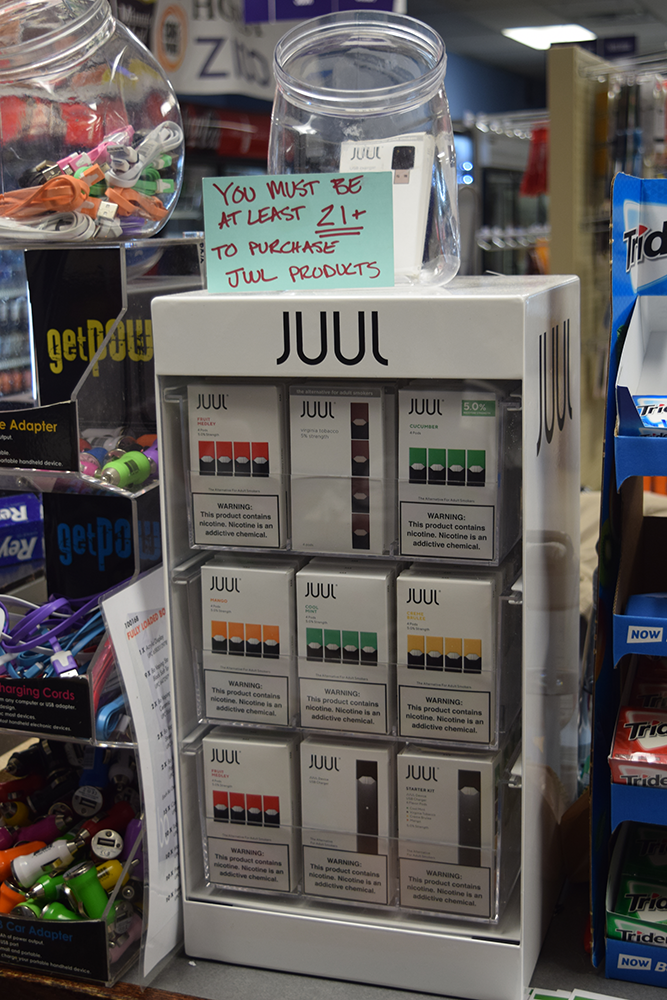Advisory Neighborhood Commission 2E unanimously passed a motion urging the Council of the District of Columbia to ban the sale of flavored electronic smoking devices at its monthly meeting Nov. 4.
ANC 2E, a local government body of elected officials, represents Georgetown, and two students serve as commissioners. Commissioner Matias Burdman (COL ’21) introduced the motion endorsing the passage of D.C. Council Bill B23-0453, the “Flavored Electronic Smoking Device Prohibition Amendment Act of 2019,” which is still under council review. The legislation would ban the sale of all flavors of e-cigarettes except tobacco and menthol.
Burdman drafted the motion after being contacted by Flavor Hooks Kids DC, a coalition of organizations including MedStar Georgetown University Hospital that lobbies against e-cigarette sales.

The bill aims to protect children, in particular, according to Burdman.
“I think this is important to do and push through to the D.C. Council because you have children getting addicted to this,” Burdman said in an interview with The Hoya. “They are using nicotine in a way that affects their brains, and in a way where they literally cannot lose, or it’s very difficult for them to lose, their dependency afterwards.”
The rise of vaping among young people is in part due to the attractiveness of flavored products, according to D.C. Councilmember Mary Cheh (D-Ward 3).
“Over the past few years, e-cigarette use has exploded among young people and continues to rise at an exponential pace,” Cheh wrote in an email to The Hoya. “The e-cigarette industry has built this youth market by targeting children through advertising and widely available flavored products—taking a note from the playbook of the closely-aligned tobacco industry.”
In August, U.S. health officials announced that they were investigating over 90 cases of severe lung illnesses associated with vaping, which has skyrocketed among teens and young adults and in recent years. In 2018, 37% of 12th graders reported having vaped in the past year, compared to 28% the year prior, according to a survey conducted by the National Institutes of Health.
Cheh introduced the bill in the D.C. Council, which is co-sponsored by Councilmember Trayon White (D-Ward 8), on Sept. 17 along with nine other councilmembers, including Jack Evans (D-Ward 2), whose ward includes the Georgetown neighborhood.
Although many people, students included, may not be pleased with a ban, the benefits outweigh the costs, according to Burdman.
“Georgetown students, or anyone who’s looking for those products, would not be able to buy one within the District of Columbia,” Burdman said. “Obviously not everyone’s going to be really happy with that, but I think overall it’s a balancing act.”
For Burdman, public health must be weighed against consumers’ demands.
“The question you have to balance is the public health benefits of introducing this legislation and then at the same time the negative effect,” Burdman said. “I think that in this case, given the fact that it’s reached epidemic proportions in children, literally, I think that it’s in my view at least simple to see that something should be done.”
Although the issue is relevant for college students, the potential ban is focused on eradicating the use of e-cigarettes among middle and high schoolers. Local parents’ concerns about children becoming addicted was a motivating factor in passing the motion, according to ANC 2E Commissioner Kishan Putta.
“As an ANC commissioner I represent two public schools, Hardy Middle School and the Duke Ellington School of the Arts, and the parents at both schools are very concerned about this, the health implications of vaping and flavored e-cigarettes,” Putta said in an interview with The Hoya.
Campaign for Tobacco-Free Kids, another group lobbying for a ban on e-cigarettes, marched to the White House on Nov. 4 with children and families to deliver a petition urging the ban that garnered over 110,000 signatures, according to The Washington Times. These types of demonstrations are crucial in drumming up support for the ban, according to Putta, who was involved in the march.
“The White House, we’re not sure what they’re proposing yet,” Putta said. “We know that they’re under tremendous lobbying from the e-cigarette industry, as is the D.C. Council, which is why it’s important to show that we have numbers. We have grassroots support as well to counteract all the money that is coming in from the other side.”
Cheh said the proliferation of stores selling e-cigarettes across Washington, D.C., including near schools, is a result of the products’ popularity. Inaction by the federal government on the issue motivated the D.C. Council to consider a bill prohibiting flavored e-cigarettes, according to Cheh.
“The federal government has recently indicated its intent to also ban flavored e-liquids, but we cannot wait for the federal government to act while flavors such as cotton candy and gummy bear e-cigarettes remain on District shelves,” Cheh wrote.





















Towing Aurora • Oct 12, 2021 at 3:21 am
I agree. It’s time consuming but you can definitely learn about this website. Thank you for sharing this wonderful information. Here’s my idea about this – The nicotine in e-liquids is readily absorbed from the lungs into the bloodstream when a person vapes an e-cigarette. Upon entering the blood, nicotine stimulates the adrenal glands to release the hormone epinephrine